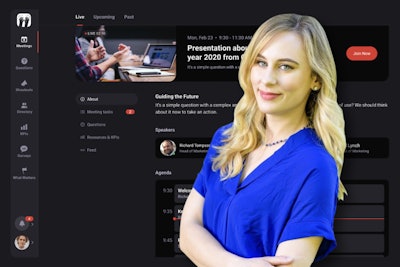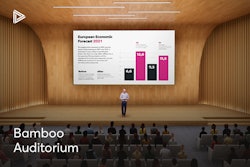
First thing first: What has your career in the event industry looked like?
I graduated from the University of Nebraska-Lincoln with a degree in hospitality, restaurant and tourism management. Through my degree program, internships and other industry networking opportunities, I was able to gain a lot of valuable experience. I worked in hotels, completed an internship at the Cannes Film Festival, attended a hospitality conference in Dubai and eventually landed my final internship before graduation at a small travel agency in my town, where I hoped to gain experience as a corporate meeting and event planner.
My first “real” job after graduation was working as a meeting coordinator for American Express Global Business Travel helping to plan meetings for Merck. My husband and I relocated to Portland in 2015, and I transitioned to the Oregon State Bar coordinating legal education events. I completed my CMP certification in 2018 and moved to a small, woman-owned corporate event planning agency in Portland where I planned corporate incentive trips, board meetings and leadership summits. The other side of the business was focused on destination management, which was really selling Oregon as a destination for out-of-state groups. Through this I got really familiar with venues, food and tours from Portland—from the coast to wine country to the mountains.
DMC work was definitely one of the most fun and rewarding aspects of the job, and I’m so thankful for all of the great people I was fortunate enough to meet. Unfortunately, when COVID hit, our business dried up, and I was laid off in the summer of 2020. It was a really challenging moment for so many talented industry professionals, and I feel very fortunate that I found Brandlive so quickly.
How has the event landscape changed since entering the industry?
I think the biggest, most obvious change has been the shift to virtual and hybrid options. Before the pandemic, most planners had little to no knowledge of how a virtual event would work, or even how a virtual component would add value for attendees. I remember conversations with some of my colleagues about being hesitant to use Zoom to meet with potential clients! The concept of adding video to any meeting seemed unnecessary.
It’s really odd to think back and remember that most planning was done over a conference call, and sometimes a client’s LinkedIn picture was the only way to know what they looked like before meeting on-site. The other thing planners really need to consider now is the health of their attendees. While attendee safety was always a priority, thinking about masks, sanitizing stations, distancing, temperature checks, etc., adds a whole new layer to any planning process and simply cannot be skipped over.
How was the shift from producing live events to virtual events for you? Did you have any hesitations?
Oh, I absolutely had hesitations! I saw the writing on the wall as the pandemic dragged on, and after being laid off abruptly, I knew virtual events made the most sense for a pivot. Because I had a strong background in project management, I was confident that I could transition to managing virtual events. However, I had never worked in tech before and was nervous about being knowledgeable enough to work in the industry. I knew zero about coding; I had never even used Slack before. I also had very limited experience with AV equipment, that was something that was usually left to an AV team on-site at a hotel.
Once I started at Brandlive, my fears quickly dissipated as I realized my client-management skills would be completely transferrable to my new role as a customer success manager. It was also invaluable to have a strong team around me. Everyone at Brandlive is always willing to share knowledge and help problem-solve.
What have been your biggest lessons learned since shifting to producing virtual events?
One of the most difficult things to accept about virtual events is when things happen that are beyond your control as a planner that can affect a show. As an in-person events planner, when things went wrong they were more tangible. I could see if a room was set the wrong way or if a catering order was incorrect, and take steps to fix it.
At a virtual event there are so many variables that could change a viewer’s perception of the end product, like their internet speed, browser choice, power outages, etc. It’s important for a virtual events planner to consider these variables and fully prepare the client for common attendee issues and questions. Including verbiage in confirmation emails or on the event page and setting up a support email can all help mitigate these common technical issues. Staying calm when things don’t go as planned and having backups at the ready in case you need to pivot is a must.
Looking forward, what role do you see virtual events having in the future?
If you had asked me this question in 2019, I wouldn’t have considered virtual events to be integral. Now that we’ve been in this space for almost two years, my perspective is completely different. Working closely with so many of the top companies in the world to produce product launches, leadership summits, fundraisers, galas and everything in between, I can’t picture events without a built-in virtual component moving forward.
A virtual option expands a client’s reach in so many ways. Clients realized they could engage more of their attendees than ever before by adding a way for them to see an event without needing to get on a plane or book a hotel room.
Pandemic or not, I think there will be an expectation from attendees moving forward that events are made accessible to all regardless of geographic location, and companies will need to add a virtual component into their program planning by default.
How did your experience in live events help prepare you for the virtual sphere? Are there any skills, tools or strategies you used for planning live experiences that translate well into the virtual world?
My skills as an event planner absolutely transferred over to the virtual world. I’d say the most important skills a great virtual event planner needs are being highly detail-oriented, a great team player, quick to react to any problems and, most importantly, calm under pressure.
I learned right away that I could repurpose my live event run of show templates for virtual events. Breaking a show down line by line, having backups in place if things don’t go as planned, managing attendee communications, following a workback schedule—these are all processes that must happen for a show to go well, no matter the format.
What advice would you offer for someone currently entering the virtual event planning space?
My biggest piece of advice would be to trust your instincts and to take the planning process one step at a time. Too many event planners (including me) become overwhelmed by the idea of a virtual event, try to make direct comparisons between the elements of a virtual event and a physical event, and get easily lost in inconsequential details.
Don’t stress about knowing every technical term or step in the process. It will only take a couple of successful virtual events under your belt to be able to understand the process. The only real way to learn is to dive right in. Attend as many virtual events as you can to get an idea of what others are doing and how they typically run. Ask colleagues in the industry about best practices and lessons learned. I’ve seen so many planners who were initially nervous about planning virtual events become experts in a few months. If you can plan a successful physical event, you can plan a successful virtual event.
Do virtual and live events have similar priorities in terms of end goals? How do the paths to achieving those goals differ?
Of course! No matter the format, client goals remain the same. Whether it is big registration numbers, to exceed last year’s fundraising goal, increased brand awareness, to sell a certain number of tickets, to grow revenue, to sell sponsorship opportunities, to create hype on social media, event goals will be very similar.
Clients are realizing that a virtual component makes their most important goals more attainable, and in most cases, their goals are surpassed because virtual makes it so simple for attendees to engage without travelling onsite.
How does Brandlive's platform move the virtual event industry forward?
As a team, we’re helping the biggest brands communicate more effectively by bringing the magic of Hollywood to work. We acknowledge that what used to happen in rooms is now happening on all types of screens, and if you want people to care, you have to entertain. The quality of your event is equal to the quality of your content.
And how are people consuming content? In shorter, more entertaining, more captivating segments. Look at Netflix, TikTok, Instagram—that’s how people consume content in their personal lives. They’re made up of stories that get people’s attention. And that’s how they want to consume it at work too. We not only have the industry-leading product suite, we also have this team of understanding, patient experts who let you know that it’s not that hard to do, once you have the right tools.
What are Brandlive's clients' main priorities for their events right now? How are you able to meet them?
At the beginning of the pandemic, clients had to quickly and unexpectedly shift to virtual out of necessity. This was a totally new area for most clients, so they didn’t have solid ideas about making their event stand out, they just needed a platform. Now that a virtual component has become an integral and expected part of any program, clients come to the table with much more specific ideas about overall goals, attendee engagement, and look and feel. We’ve all been to many virtual events by now, and experience has shaped our ideas about what is possible.
Now clients are interested in pushing the limits to create memorable experiences and exceeding expectations. I’ve seen live painting demonstrations, dance groups, wine tastings, amazing musical performances, even a circus with acrobats! A run-of-the-mill Powerpoint presentation on a screen is no longer enough for clients or their attendees. This new energy is one of the many reasons that this space is such an exciting place to work!
Is there a client of Brandlive's that you feel acts as a good example of how to successfully operate a virtual event?
Yes! It’s impossible to choose just one, though.
I’d urge people to check out "The B Word" story on our site. The event featured Elon Musk, Jack Dorsey and Cathie Wood, and its goal was to demystify and destigmatize Bitcoin and explain how institutions can embrace it—with a content-packed one-day event.
Another really great event was Venture Into Cures, an inspiring digital show featuring moving stories about Epidermolysis Bullosa (EB) families. The show raised awareness and funds for critical research to treat and cure EB, a life-threatening genetic disorder that affects children from birth. Celebrity guests included Selena Gomez, Ed Sheeran, Jack Black, Pearl Jam and more.



















